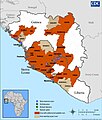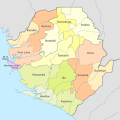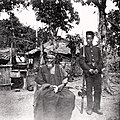Portal:Sierra Leone
The Sierra Leone Portal  Sierra Leone, officially the Republic of Sierra Leone, is a country on the southwest coast of West Africa. It shares its southeastern border with Liberia and is bordered by Guinea to the north. With a land area of 71,740 km2 (27,699 sq mi), Sierra Leone has a tropical climate and with a variety of environments ranging from savannas to rainforests. According to the 2015 census, Sierra Leone has a population of 7,092,113, with Freetown serving as both the capital and largest city. The country is divided into five administrative regions, which are further subdivided into 16 districts. Sierra Leone is governed as a presidential republic, with a unicameral parliament and a directly elected president. Sierra Leone is a secular state with the constitution providing for the separation of state and religion and freedom of conscience, encompassing freedom of thought and religion. Muslims constitute three-quarters of the population with a significant Christian minority. Notably, religious tolerance is very high, reflecting a social norm and part of the nation's cultural identity. Sierra Leone's current territorial configuration was established by the British Empire through two historical phases: initially, the coastal Sierra Leone Colony was founded in 1808 to resettle returning Africans following the abolition of the slave trade; subsequently, the inland Protectorate was created in 1896 in the wake of the Berlin Conference of 1884–1885. This led to the formal recognition of the territory as the Sierra Leone Colony and Protectorate, or British Sierra Leone. Independence from the United Kingdom was attained in 1961, with Sierra Leone transitioning into a Commonwealth realm as the Dominion of Sierra Leone under the leadership of Prime Minister Sir Milton Margai of the Sierra Leone People's Party (SLPP). Under prime minister Siaka Stevens of the All People's Congress (APC), the country adopted a new constitution in 1971, transforming Sierra Leone into a presidential republic with Stevens as the inaugural president. After declaring the APC the sole legal party in 1978, Stevens was succeeded by Joseph Saidu Momoh in 1985. Momoh's enactment of a new constitution in 1991 reintroduced a multi-party system. That year, a protracted civil war initiated, featuring the government and the Revolutionary United Front (RUF) rebel group, leading to significant turmoil. The conflict, characterized by multiple coups d'état, persisted for 11 years. Intervention by ECOMOG forces and later the United Kingdom resulted in the defeat of the RUF in 2002, ushering in a period of relative stability and recovery efforts. The remaining two main political parties are the APC and the SLPP. (Full article...) Selected article -The Sierra Leone Civil War (1991–2002), or the Sierra Leonean Civil War, was a civil war in Sierra Leone that began on 23 March 1991 when the Revolutionary United Front (RUF), with support from the special forces of Liberian dictator Charles Taylor's National Patriotic Front of Liberia (NPFL), intervened in Sierra Leone in an attempt to overthrow the Joseph Momoh government. The resulting civil war lasted almost 11 years, and had over 50,000, up to 70,000, casualties in total; an estimated 2.5 million people were displaced during the conflict. During the first year of the war, the RUF took control of large swathes of territory in eastern and southern Sierra Leone, which were rich in alluvial diamonds. The government's ineffective response to the RUF and the disruption in government diamond production precipitated a military coup d'état in April 1992, organized by the National Provisional Ruling Council (NPRC). By the end of 1993, the Sierra Leone Army (SLA) had succeeded in pushing the RUF rebels back to the Liberian border, but the RUF recovered and fighting continued. In March 1995, Executive Outcomes (EO), a South Africa-based private military company, was hired to repel the RUF. Sierra Leone installed an elected civilian government in March 1996, and the retreating RUF signed the Abidjan Peace Accord. Under UN pressure, the government terminated its contract with EO before the accord could be implemented, and hostilities recommenced. (Full article...)General images -The following are images from various Sierra Leone-related articles on Wikipedia.
Entries here consist of Good and Featured articles, which meet a core set of high editorial standards.
Sierra Leone competed at the 2012 Summer Olympics in London, from 27 July to 12 August 2012. This marked the nation's tenth appearance at the Summer Olympics since its debut in the 1968 Summer Olympics. The Sierra Leone delegation included two track and field athletes; Ibrahim Turay, a sprinter and Ola Sesay, a long jumper. Sesay and Turay were selected as flag bearers for the opening and closing ceremonies respectively. Neither of the two athletes progressed beyond the first round. (Full article...) CategoriesDid you know
TopicsProvinces: Eastern Province • Northern Province • Southern Province • Western Area History: Sierra Leone Colony and Protectorate • Kingdom of Koya • British West Africa • Sierra Leone Liberated Africans • Sierra Leone Civil War • United Nations Mission in Sierra Leone Law: Sierra Leone Police • Special Court for Sierra Leone • Truth and Reconciliation Commission • Prisons in Sierra Leone Politics: List of Presidents • Political Parties • Parliament • Foreign relations • Elections • Military of Sierra Leone Geography: Protected • Sierra Leone River • Western Guinean lowland forests • Outamba-Kilimi National Park • Transport Society: Sport • Demographics • Education • Cuisine • Media • Music Symbols: Flag • Coat of arms • National anthem (High We Exalt Thee, Realm of the Free) Selected picture -
 Credit: L. Lartigue and USAID Diamond mining in Kono District, diamonds are key part of the economy of Sierra Leone. (read more . . . ) Related portalsWikiProjectsAssociated WikimediaThe following Wikimedia Foundation sister projects provide more on this subject:
Things to do
Discover Wikipedia using portals |

























































